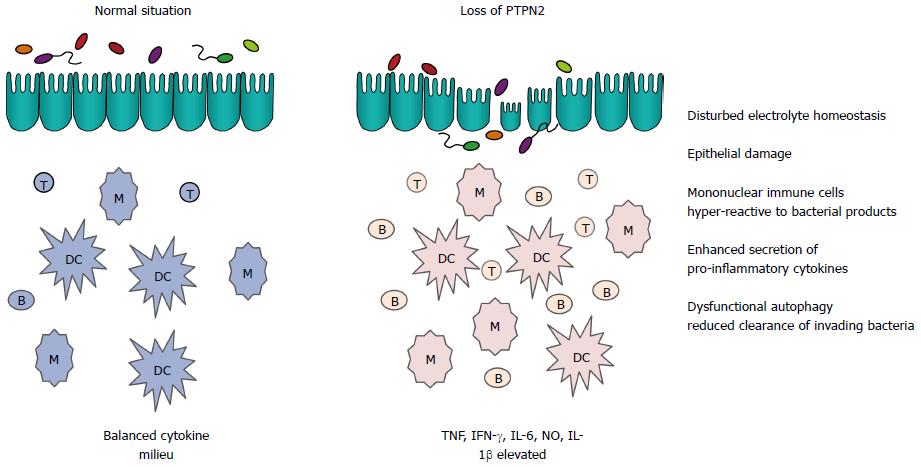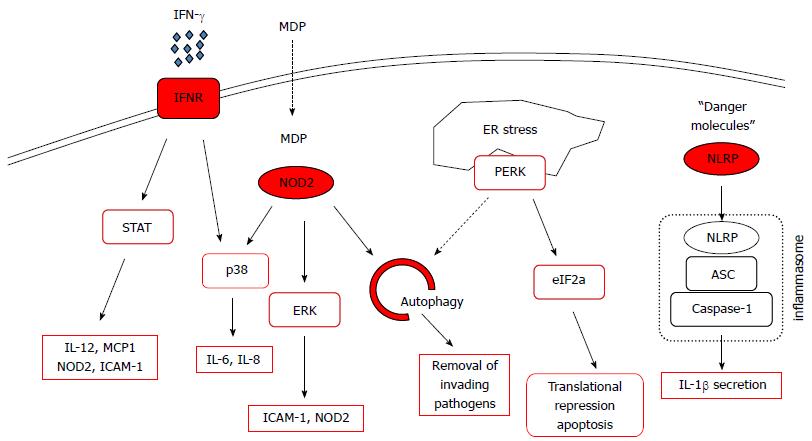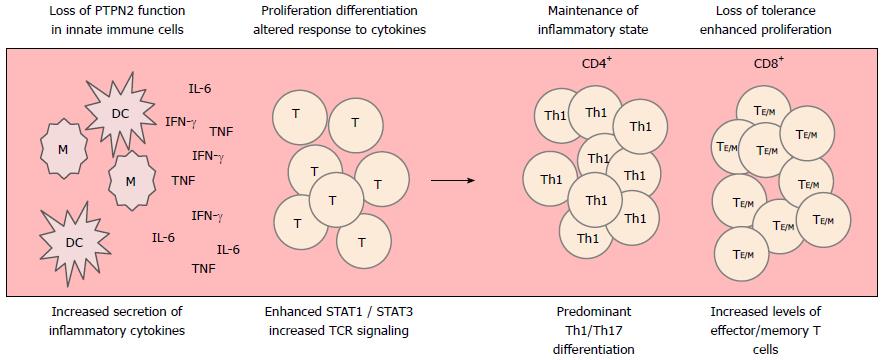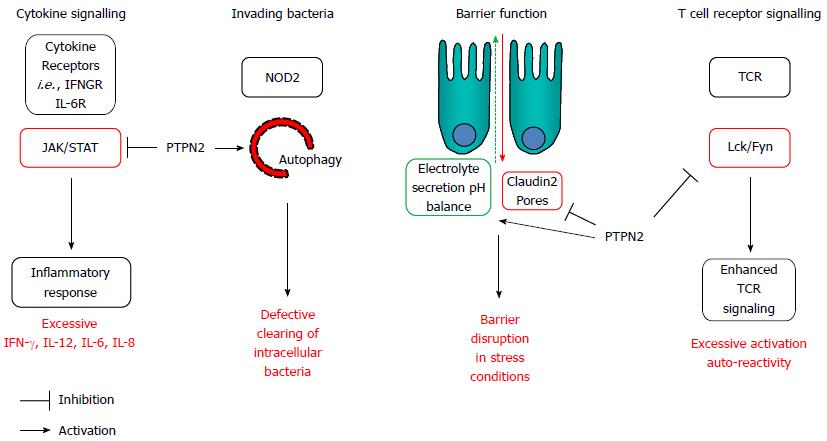Copyright
©The Author(s) 2016.
World J Gastroenterol. Jan 21, 2016; 22(3): 1034-1044
Published online Jan 21, 2016. doi: 10.3748/wjg.v22.i3.1034
Published online Jan 21, 2016. doi: 10.3748/wjg.v22.i3.1034
Figure 1 Effect of loss of protein tyrosine phosphatase non-receptor type 2 on innate immune functions in the intestine.
When protein tyrosine phosphatase non-receptor type 2 (PTPN2) is lost either by genetic deletion in the mouse or due to genetic variants in inflammatory bowel disease (IBD) patients, several aspects of innate immunity are affected, ultimately resulting in inflammation. Depicted are mechanisms that play pivotal roles in intestinal homeostasis. B: B cell; DC: Dendritic cell; IFN: Interferon; M: Macrophage; NO: Nitric oxide; T: T cell; TNF: Tumour necrosis factor; IL: Interleukin.
Figure 2 Signaling pathways affected by protein tyrosine phosphatase non-receptor type 2.
Depicted are pathways that play important roles in intestinal homeostasis, factors with red margins are directly influenced by protein tyrosine phosphatase non-receptor type 2 (PTPN2). ASC: Apoptosis-associated speck containing protein; eIF2a: Eukaryotic translation initiation factor 2A; ER: Endoplasmatic reticulum; ERK: Extracellular-stress activated kinase; ICAM-1: Intercellular adhesion molecule-1; IFN: Interferon; IL: Interleukin; MCP1: Monocyte-chemoattracting protein 1; MDP: Muramyl-dipeptide; NLRP: Nod-line receptor protein; NOD2: Nucleotide oligomerization containing 2; PERK: Protein Kinase RNA-like endoplasmic reticulum kinase; STAT: Signal transducer and activator of transcription.
Figure 3 Loss of protein tyrosine phosphatase non-receptor type 2 affects several aspects of T cell development.
Loss of protein tyrosine phosphatase non-receptor type 2 (PTPN2) in innate immune cells results in enhanced secretion of pro-inflammatory cytokines, including IFN-γ, IL-6 and IL-1β. In CD4+ T cells, these cytokines are involved in driving Th1 and Th17 development. Loss of PTPN2 in CD4+ T cells further potentiates the IFN-γ/IL-6-induced activation of STAT1/STAT3, what further strengthens the development of Th1/Th17 cells. Further, loss of PTPN2 results in enhanced TCR signaling strength what drives aberrant activation and proliferation of naïve T cells and escape of auto-reactive T cells from negative selection. Ultimately, this leads to the generation of increased levels of effector and memory T cells. DC: Dendritic cell; IFN: Interferon; M: Macrophage; TNF: Tumour necrosis factor; IL: Interleukin; STAT: Signal transducer and activator of transcription; TCR: T-cell receptor.
Figure 4 Protein tyrosine phosphatase non-receptor type 2 influences pathways involved in inflammatory bowel disease pathogenesis.
A: Protein tyrosine phosphatase non-receptor type 2 (PTPN2) dephosphorylates JAK1/2 and STAT1/3/5 to control inflammatory cytokine signaling; B: PTPN2 promotes autophagy induction in response to invading bacteria; C: In epithelial cells PTPN2 protects against inflammation-induced barrier defects; D: In T cells, PTPN2 counteracts TCR associated kinases and thereby reduces the reaction towards cognate antigens. IL: Interleukin; JAK: Janus activated tyrosine kinase; Lck: Lymphocyte tyrosine kinase; NOD2: Nucleotide oligomerization domain containing protein 2; STAT: Signal transducer and activator of transcription; TCR: T cell antigen receptor.
- Citation: Spalinger MR, McCole DF, Rogler G, Scharl M. Protein tyrosine phosphatase non-receptor type 2 and inflammatory bowel disease. World J Gastroenterol 2016; 22(3): 1034-1044
- URL: https://www.wjgnet.com/1007-9327/full/v22/i3/1034.htm
- DOI: https://dx.doi.org/10.3748/wjg.v22.i3.1034












